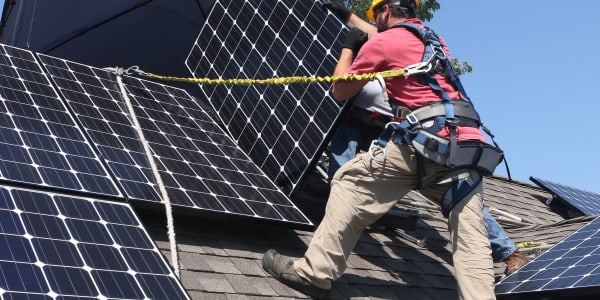
It knows when you are sleeping, it knows when you're awake. No, it's not Santa Claus. It's your house. Smart technology has already enabled homeowners to control their utilities, their temperature, even their security from hand-held devices inside and outside the home. What's next?
"Ideally I'd like to operate nothing, but have the home learn my patterns," said 24-year-old Jay Austin, a homeowner in Washington, D.C. "But I think we're probably about five years away from this really making sense to people."
Or are we? Google's recent acquisition of Nest for $3.2 billion makes it seem like we are closer than we think to fully automated housing. Nest, a technology company whose most well-known product is a thermostat that learns the daily habits of its users, is the perfect example of how valuable home automation has become, to its users and to other companies like Google.
(Read more: 7 bold commercialreal estate predictions)
"Homes are going to become smart, not just from building materials, but being able to automate them with control lighting systems through computers, air conditioning systems, security, the whole range of things, from locking mechanisms, even managing utilities from individual appliances is going to be a big, big part of the single family home," said Lawrence Scarpa, a California-based architect with Brooks + Scarpa.
Right now companies like Comcast, AT&T and Microsoft are offering devices that not only allow us to control things in our homes from a distance, but connect all the automation on one platform. Energy efficiency is behind much of the drive toward automation, but security isn't far behind.
The August Smart Lock, is one of the latest technologies, allowing homeowners to control their door locks from a mobile device.
(Read more: How we will live: More green, more urban, more efficient)
"When you add an electronic door lock to your home, you have the power of encryption technology, so you can basically give a key to one person at a time and you define it for that person for a particular day," said Jason Johnson, CEO of August, on CNBC's Squawkbox.
The smartest technology, which learns from the homeowner, is evolving; buyers today are still getting used to simpler applications that allow them to control their homes' thermostats and other utilities from a hand-held device. These offerings are available but not always standard in all new homes.

"I think we're getting closer to it," said John Jaffe, chief operating officer of Miami-based Lennar. "If you look at the car as a proxy. Years ago Bluetooth was a novelty, now every car comes with them. I would think we're all there in five years."
Lennar homes do have some automation standards, but new technologies that could control solar panels or sprinklers based on the weather each day are still a ways off.
(Read more: Will the American Dream still include owning a home?)
"The cost of electric consumption, which is growing, will become more important to the consumer as it gets more expensive, and then it becomes more of a must-have," added Jaffe.
While today's homes don't look exactly like the Jetson's apartment, they are getting closer. Smart appliances are already complimenting smart utilities, and the smarter it all gets, the less homeowners will likely have to pay for the energy to keep all those smarts running smoothly.
Disclosure: Comcast is the owner of NBCUniversal, the parent company of CNBC and CNBC.com.
—By CNBC's Diana Olick. Follow her on Twitter @Diana_Olick.
Questions? Comments? facebook.com/DianaOlickCNBC.





